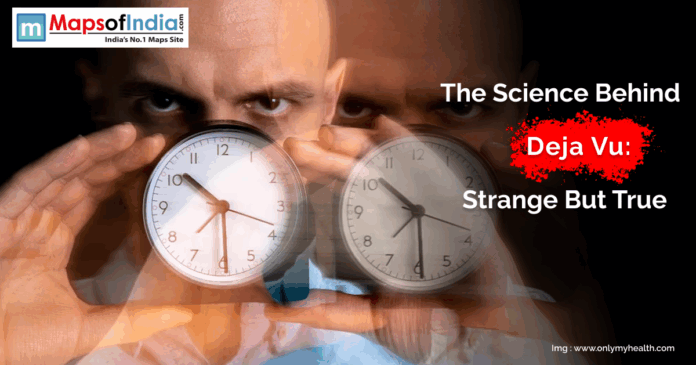Deja vu is a strange feeling that what you are experiencing has happened before. Having deja vu feels like experiencing a glitch in reality. When you walk into a room, you feel like you have come here before even though it’s your first time. When you are having a conversation, you feel like you have had the same conversation before. It’s like you are waking from the matrix. This fleeting sensation has captivated us all at some point. Deja vu has a blend of memory, perception, and brain quirks. Having deja vu is not supernatural, but it’s deeply intriguing.
What Is Deja Vu?
Deja vu in French means “already seen”. Deja vu is a feeling of reliving a moment even though you are experiencing it first time. Most people have experienced it at some point in life. It can be experienced most commonly in the age group of 15 to 25. This sensation lasts for a few seconds. What we experience is vivid but hard to pin down exactly. You feel you’ve experienced this exact moment before. Yet it’s your first time experiencing it. According to a Psychology Today report, they described this as an illusion of memory. It’s not your past life’s memories or any divine signals. It’s your brain misfiring sometimes. Things like Stress, fatigue, or distraction can cause deja vu. Scientists have been studying it to understand memory. This can be a window into how our minds work.
The Brain’s Role in Deja Vu
Scientifically speaking, Deja vu starts in the brain. The temporal lobe, especially the hippocampus, is key to this process. This area of the brain handles memory and familiarity. When someone experiences deja vu, at that time neurons misfire. The brain mistakes a new experience for an old one. According to a recent study where they used brain scans. It has been seen an overlapping activity in memory and perception regions. The prefrontal cortex, which checks reality sometimes lags. This process in the brain creates a false sense of familiarity. According to fMRI studies has been revealed that hyperactive neural connections have been revealed. These brief glitches in the brain mimic past memories. Deja vu is like a short circuit that happens in the brain, confusing “now” with “then.”
Memory Misfires and Theories
Memory plays a crucial role in human existence. The dual processing theory is popular. As per this theory, familiarity and recollection run separately in the brain. When someone experiences deja vu, the part of the brain which associates with familiarity activates without recollection. That’s why you feel you know the moment but can’t recall why. Another theory about deja vu is the hologram model. According to this theory, it posits that memories are stored in fragments in our brain. A new scene or setting matching a fragment you have known before can trigger deja vu. According to a 2022 Scientific American article, Small cues, like a scent or sound, spark the sensation in our brain. According to the Gestalt theory, it is linked to the pattern of recognition. Your brain starts to see a familiar scene in a new environment. Studying these theories, we can see how complex memory works. Deja vu reveals its quirks.
Triggers and Common Scenarios
There are some conditions that spark deja vu. Fatigue and stress are one of the few key reasons for deja vu. According to a study, it has been revealed that sleep deprived people experience more deja vu episodes. Sometimes, Travel or being in new environments can cause deja vu. Even though you are in a new city, the city can be strangely familiar. Young adults from the age of 15 to 25 experience it most. During that age, their brains are forming new neural pathways. According to a study more than 70% of deja vu episodes occur in social settings. Sometimes, some drugs can cause it. Seizures in epilepsy patients often include deja vu. Understanding the triggers of deja vu can help to demystify the experience.
Deja Vu and Neurological Conditions
Deja vu has a direct link to our brain’s health. In epilepsy, it’s a common symptom to have an aura before seizures. Hyperactivity in the temporal lobe can cause intense familiarity with surroundings. Some patients have described some vivid deja vu lasting minutes. It’s a diagnostic clue for neurologists. These can cause some other conditions too, like migraines. Brain injuries or strokes may increase the occurrence of deja vu. Neurologists use deja vu to study memory disorders. According to their study, Alzheimer’s patients rarely experience deja vu. Their hippocampus is impaired. This contrast helps researchers. Deja vu isn’t always benign. Constant occurrence of it may be harmful. If it happens, consulting with doctors may be good.
Cultural and Psychological Perspectives
Deja vu has fascinated cultures worldwide. In India, some people believe that these are past life memories. As per some Hindu beliefs, it has something to do with reincarnation. Western cultures often view it as a brain quirk. Writers like Dickens used it to evoke mystery in their books. Psychologically, it can feel unsettling. It can be described as a “cognitive hiccup.” Some feel awe and others feel unease. It challenges our sense of reality. We can hear many stories of people having gained past life memories. These tales give it a mysterious nature. Yet science grounds it in biology.
Future Research and Implications
Now, scientists have developed an AI model that will analyse brain scans. This device will analyse and draw a map of neural patterns during the occurrence of deja vu. This could unlock memory’s secrets. Some researchers at MIT have recreated scenes to induce the sensation. According to a recent study deja vu can help in learning. It may help the brain process new information. Understanding deja vu could help improve memory therapies. But there are still many mysteries around it. Why does it feel so vivid? Can it be controlled? Scientists are trying to answer these questions. Deja vu bridges neuroscience and philosophy.
Conclusion
Deja vu is a captivating phenomenon which occurs in our brain. At that time, we felt out of the world. It feels like something great and out of this world. As per scientific research, it is the brain’s memory systems. Inside the brain, the hippocampus and temporal lobe create this illusion. Stress, fatigue, and new settings trigger it. It’s tied to epilepsy and other conditions. It’s not magic, but it feels like it. Deja vu reminds us how complex and beautiful our brains are.




